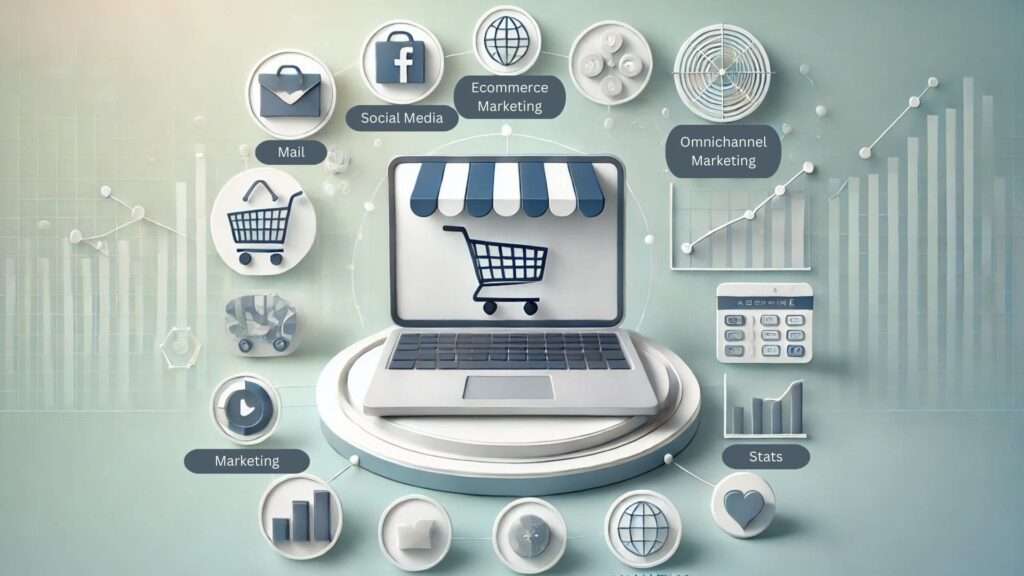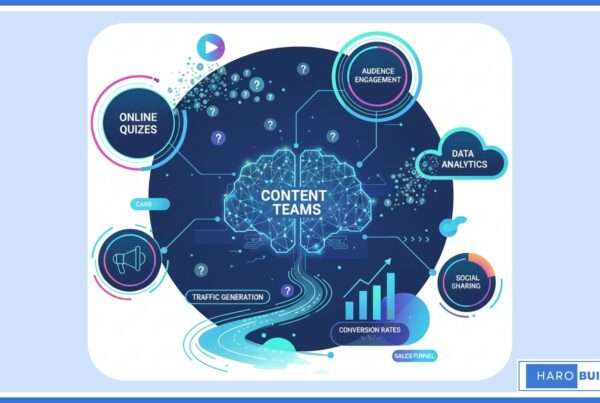
Struggling to grow your ecommerce business amidst stiff competition and changing consumer behaviors? Research shows that only businesses adopting innovative ecommerce marketing solutions can maintain visibility in crowded marketplaces. Many ecommerce platforms face challenges like low conversion rates, inadequate SEO efforts, and ineffective social media marketing campaigns.
The solution lies in combining data-driven strategies, effective marketing services, and optimized search engine practices. This empowers your ecommerce store to achieve scalable growth and enhance customer engagement.
This article presents the 10 best ecommerce marketing solutions in 2025. It offers actionable insights for implementing robust marketing strategies and boosting online sales.
What is Ecommerce Marketing?
Ecommerce marketing refers to the process of promoting an online store and its products to drive traffic, increase conversions, and boost online sales. It involves utilizing diverse marketing channels like search engine optimization (SEO), email marketing, social media marketing, and content marketing.
Moreover, ecommerce businesses often employ marketplace strategies to reach a broader audience. By focusing on marketing solutions tailored to their ecommerce website, businesses aim to optimize their conversion rates while fostering long-term customer relationships. Tools such as the best email verification service are also commonly used to maintain clean email lists, ensuring higher deliverability and engagement for email marketing campaigns.
Unlike traditional methods, ecommerce marketing combines data-driven strategies with creative campaigns to achieve measurable results. Businesses also rely heavily on their marketing team to execute these strategies effectively. Evidently, the integration of digital marketing services and tools has transformed how businesses engage with online shoppers. Thus, ecommerce marketing remains an essential component for any online business looking to thrive in the competitive marketplace.
Why Ecommerce Digital Marketing is Important in 2025?
Ecommerce digital marketing is crucial in 2025 because it ensures businesses remain competitive in an evolving landscape. Effective use of search engines, email marketing, and social media platforms allows businesses to reach their target audience with precision. Moreover, digital marketing helps ecommerce businesses enhance their online presence and improve their ecommerce store’s conversion rate optimization.
“If your business is not on the internet, then your business will be out of business,”– Bill Gates
Chiefly, marketing campaigns that utilize ecommerce SEO and innovative marketing strategies ensure consistent growth. Furthermore, tools like ecommerce platforms and advanced analytics enable data-driven decisions to maximize results. Altogether, digital marketing facilitates seamless interaction between businesses and customers, helping them build trust and loyalty. Consequently, it remains a cornerstone for scaling online businesses, ensuring they adapt to changing consumer behaviors.
10 Best Ecommerce Marketing Solutions
1. AI-Driven Personalization:
AI-driven personalization analyzes customer data to offer tailored recommendations, significantly increasing online visibility and conversions. For instance, ecommerce marketing companies implement AI tools that help businesses enhance user experiences and drive online sales effectively. Correspondingly, this strategy empowers ecommerce agencies to craft marketing plans that match individual preferences.
Integrating AI within eCommerce digital marketing strategies, including AI calls, ensures the best results by targeting customers with precision. AI also enables businesses to monitor customer behavior, improving multi-channel marketing outcomes. With AI-powered marketing tools, companies specializing in eCommerce achieve their marketing goals seamlessly.
2. Voice Commerce Optimization:
Voice commerce optimization transforms ecommerce sites into platforms compatible with voice-enabled searches, boosting overall digital presence. Marketing experts recommend this tactic for driving traffic to your ecommerce store by leveraging voice assistant capabilities. Businesses can also incorporate digital advertising strategies focused on natural language processing to meet this trend’s demands.
Comparatively, voice commerce simplifies navigation for online shoppers, leading to increased online sales and a better user experience. Moreover, companies specializing in ecommerce marketing solutions use voice optimization to achieve significant growth by aligning with consumer behaviors.
3. Augmented Reality (AR) Shopping Experiences:
AR shopping experiences enrich online visibility by allowing online shoppers to visualize products virtually before purchasing. Digital agencies employ AR marketing platforms to boost traffic to your online store and build consumer confidence. Visual assets also play a key role in immersive ecommerce experiences, and using an AI-powered visual content tool like the one from Depositphotos allows brands to quickly generate high-quality, customized imagery tailored to their audience. Ecommerce clients particularly appreciate AR features for reducing product return rates and enhancing online presence.
Companies specializing in ecommerce marketing solutions also integrate AR into their digital channels, providing interactive and immersive shopping options. AR not only improves customer engagement but also supports multi-channel marketing efforts to drive online sales effectively.
4. Gamification in Ecommerce:
Gamification in ecommerce turns shopping into an engaging activity by integrating rewards, challenges, and interactive features. This innovative tactic is widely adopted by ecommerce marketing agencies to increase sales and boost customer loyalty. Evidently, marketing automation tools ensure seamless gamification, making it easier for businesses to implement interactive strategies.
For example, full-service ecommerce marketing agencies design gamified experiences tailored to specific ecommerce companies to drive results. Furthermore, gamification builds brand loyalty by providing customers with incentives, while simultaneously achieving marketing goals like improved retention rates.
5. Influencer Marketing:
Influencer marketing is a proven strategy for ecommerce brands to enhance their digital marketing efforts effectively. By partnering with influencers, ecommerce agencies can create impactful campaigns to reach online shoppers directly. This tactic ensures targeted marketing by aligning influencer content with the interests of specific consumer segments.
Notably, influencers help ecommerce companies build authentic connections with audiences, thereby increasing their online presence. Besides, influencer marketing is integral to multi-channel marketing strategies, offering businesses an effective way to boost online sales and visibility simultaneously.
6. AI-Powered Customer Support:
AI-powered customer support offers ecommerce businesses scalable solutions for providing efficient and personalized service to shoppers. Chatbots, for instance, streamline communication across digital channels, enhancing overall user experiences and customer satisfaction. Digital marketing services often integrate AI tools to help ecommerce businesses handle inquiries and order management seamlessly. Additionally, this technology reduces response times and ensures round-the-clock support, increasing online sales for ecommerce clients. Companies that specialize in ecommerce digital marketing utilize AI agents for customer retention while simultaneously meeting growing consumer expectations.
7. Subscription-Based Ecommerce Models:
Subscription-based models allow ecommerce businesses to generate consistent revenue while fostering long-term customer relationships. Marketing experts emphasize the value of recurring subscriptions to enhance ecommerce companies’ online presence and overall marketing efforts. Businesses can leverage digital marketing agencies for ecommerce to implement data-driven ecommerce marketing strategies around subscription services.
Particularly, subscription-based models are tailored to drive online sales by providing personalized offerings that align with customer needs. Additionally, marketing platforms designed for ecommerce email marketing campaigns support subscription models, ensuring effective marketing and improved customer loyalty.
8. Omnichannel Marketing for Unified Customer Experiences:
Omnichannel marketing aligns ecommerce solutions across multiple platforms to create seamless interactions and better customer engagement. Marketing tactics involve integrating websites, social media, and email marketing campaigns to boost your online store’s traffic. Full-service digital marketing agencies play a significant role in synchronizing these efforts to enhance the effectiveness of marketing goals.
Businesses specializing in ecommerce leverage marketing automation tools to unify their digital channels for a consistent online presence. Moreover, omnichannel strategies focus on targeted marketing, leading to increased online visibility and improved user retention.
9. Social Commerce Growth:
Social commerce uses social media platforms to enhance ecommerce digital marketing strategies and connect with online shoppers. Marketing and SEO professionals help ecommerce clients optimize their content for shoppable posts on platforms like Instagram and TikTok. This approach increases online sales by simplifying purchase journeys, making it easier for customers to shop.
Furthermore, ecommerce marketing agencies utilize data-driven ecommerce marketing insights to create engaging content for these platforms. Undoubtedly, social commerce is a powerful tactic to enhance multi-channel marketing and build an impactful online presence.
10. Trust Building User-Generated Content:
User-generated content (UGC) builds trust and credibility for ecommerce brands by showcasing authentic customer experiences. For example:
- Encouraging reviews increases online visibility and boosts traffic to your ecommerce site.
- Sharing customer photos and videos on digital channels improves engagement and retention.
- Highlighting testimonials helps ecommerce businesses achieve effective marketing and build long-term customer relationships.
Marketing agencies focused on ecommerce often include UGC ads in digital advertising campaigns to enhance authenticity. Correspondingly, these efforts align with data-driven ecommerce marketing, ultimately driving online sales effectively.
Emerging Trends in eCommerce Marketing for 2025
The landscape of eCommerce marketing is evolving rapidly, driven by technological advancements and shifting consumer behaviors. Businesses aiming to achieve sustainable growth must stay ahead by embracing modern techniques and refining their marketing goals. As competition increases, a well-crafted ecommerce digital marketing strategy becomes crucial to maintain a strong online presence. Keeping up with digital marketing trends ensures that businesses stay competitive and effectively engage their target audience.
“Ecommerce success lies in adapting to trends while building meaningful connections with your audience.” – Neil Patel
- Personalized Shopping Experiences: Leveraging marketing automation tools to deliver tailored recommendations based on customer preferences and purchase history.
- Hyper-Targeted Marketing Campaigns: Using advanced digital advertising techniques to target niche segments and boost ecommerce email marketing effectiveness.
- Decentralized Social Commerce: Allowing online shoppers to complete purchases directly through social media channels for seamless transactions.
- Collaborative Marketing Platforms: Partnering with innovative marketing agencies specializing in ecommerce to achieve measurable results.
- Voice Search Optimization: Adapting SEO services to accommodate voice-based searches and enhance online visibility.
“Adaptation is key—only the innovative thrive in the rapidly changing ecommerce landscape.” – Jeff Bezos
Conclusion
The right ecommerce marketing solution can transform your online business by driving conversions and improving customer engagement. Utilizing proven marketing strategies, such as content marketing and SEO, will deliver measurable results.
Which of these solutions do you think will revolutionize your ecommerce business in 2025?
FAQs
1. What is conversion rate optimization in ecommerce?
It focuses on improving website elements to turn more visitors into paying customers.
2. Why is social media marketing crucial for ecommerce businesses?
It helps build brand awareness, connect with customers, and drive traffic to online stores.
3. What is the best way to increase marketplace visibility?
Optimize product listings and use advertising services offered by the marketplace.
4. How can a digital marketing agency help an ecommerce business?
They provide specialized services, including SEO, content marketing, and paid advertising, to increase sales.
5. Why is a data-driven approach essential for ecommerce marketing?
It helps in making informed decisions and tailoring marketing efforts for higher returns.
6. What ecommerce platform features should businesses prioritize?
Features like mobile responsiveness, SEO tools, and seamless integration with marketing channels are crucial.



